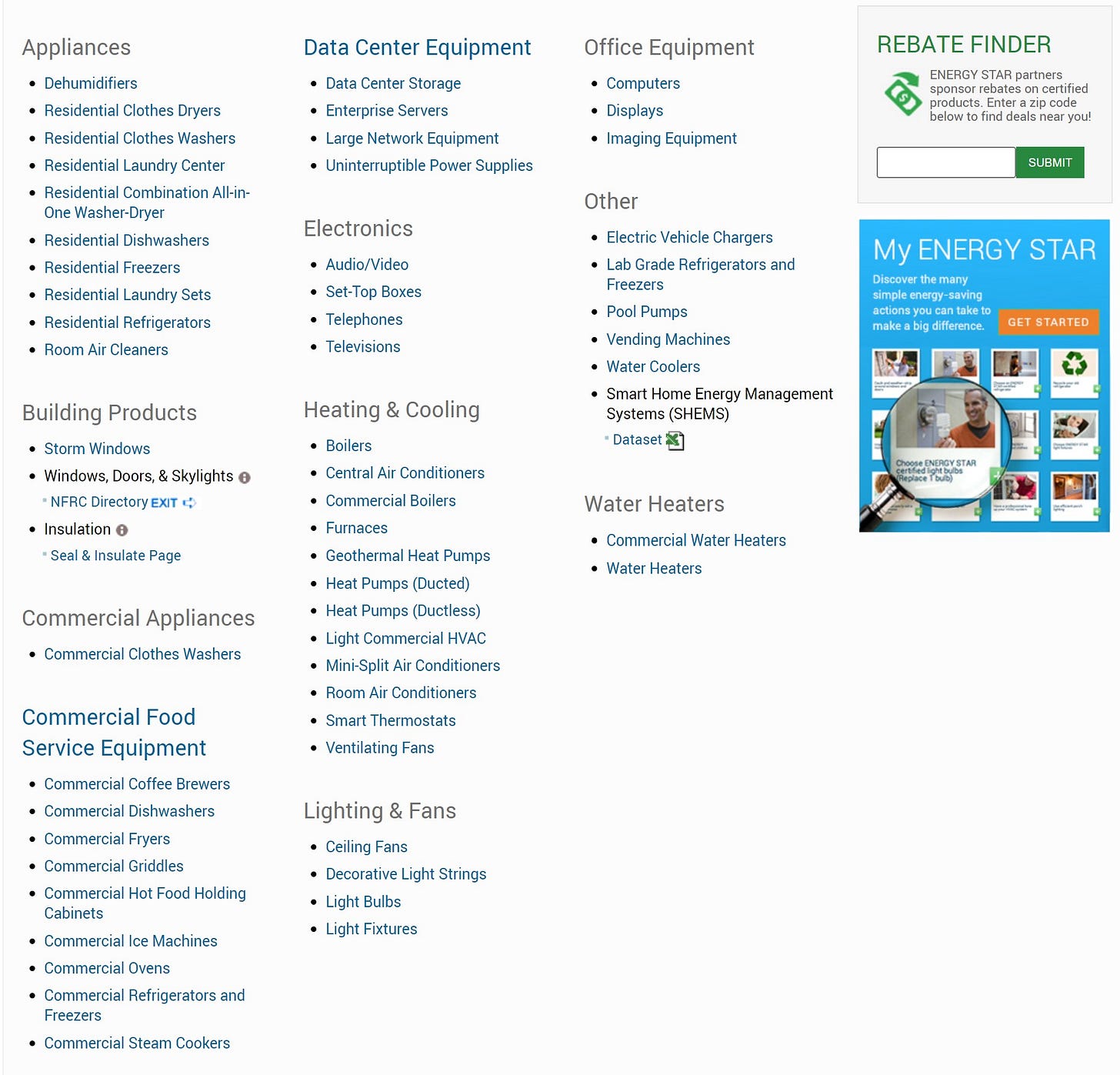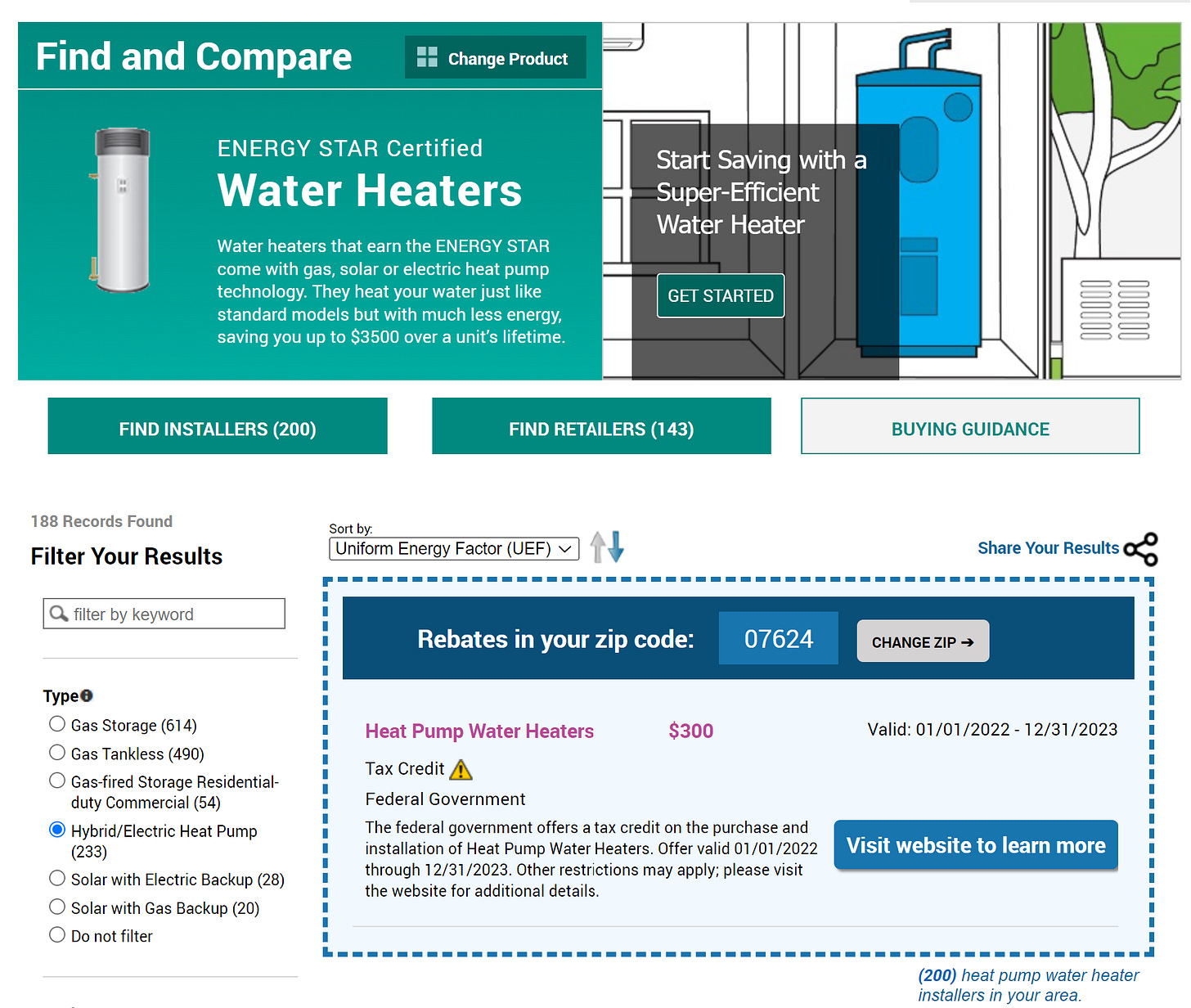EnergyStar's Product Guide
Great way to find products, retailers, installers, rebates, general information
WHAT IS EnergyStar?
According to their website:
ENERGY STAR® is the government-backed symbol for energy efficiency, providing simple, credible, and unbiased information that consumers and businesses rely on to make well-informed decisions. Thousands of industrial, commercial, utility, state, and local organizations—including nearly 40% of the Fortune 500®—partner with the U.S. Environmental Protection Agency (EPA) to deliver cost-saving energy efficiency solutions that protect the climate while improving air quality and protecting public health. Since 1992, ENERGY STAR and its partners have helped American families and businesses save 5 trillion kilowatt-hours of electricity, avoid more than $500 billion in energy costs, and achieve 4 billion metric tons of greenhouse gas reductions. Over the lifetime of the program, every dollar EPA has spent on ENERGY STAR resulted in nearly $350 in energy cost savings for American business and households. In 2020 alone, ENERGY STAR and its partners helped Americans save more than 520 billion kilowatt-hours of electricity and avoid $42 billion in energy costs.
I looked at the EnergyStar.gov site expecting to find out how to purchase and install an energy-efficient appliance but I found MUCH more than that.
The website not only allows you to look up a type of appliance, and figure out its energy efficiency, but it also can help you find out where you can buy it, who can install it, as well as what tax credits or rebates are available. It even includes the recent Inflation Reduction Act information. The retailer/installer information could be critical for newer technology that not all HVAC/plumbers/electricians may be familiar with, or comfortable with installing.
It ALSO has a comprehensive Home Energy Advisor with personalized recommendations, which is covered in a different newsletter in this site called “Evaluating Your Home and Coming Up with an Energy Strategy”.
PRODUCT INFORMATION
Let’s cover their product info step-by-step.
If you know what type of product you want to buy but not exactly what manufacturer or model, start at their Product Finder page:
For the sake of this example, I chose “Water Heaters” and I got a comprehensive guide, that included:
a large set of filtering criteria on the left hand side,
tax credit and rebate information at the top,
buttons to find installers and retailers,
a button for “Buying Guidance”, which leads to extensive information on the types of equipment available, explanations of how they work, and what to look for
and a list of products that went on…and on. Each product had extensive specifications:
(Additional filter criteria and listings were omitted.)
Clicking on any “Click for Product Details” button gives specifications for that individual mode. For example, here is the the page for the second model in the list. Clicking on an “i” in a black circle gives additional information about the meaning of the specification. You can also download the information.
TAX CREDITS AND REBATES
This information for your area is available in many places throughout the EnergyStar.gov website. It lists available tax credits (and their eligibility requirements), and rebates in your area.
BUYING GUIDANCE
If I had clicked on “Buying Guidance” in the Water Heater Example above, this is what I would have seen:
I selected “Heat Pump”, and got all kinds of information from videos, to extensive contractor checklists, explanations of how heat pumps work, etc.
(Some material omitted)
(Some material omitted)
Clicking on the “How It Works” button above, gave me this explanation:
CONCLUSION
EnergyStar.gov has a GREAT DEAL of information, from general explanations of a product type to specific specifications for every EnergyStar-certified product. You can also use it to find retailers and installers. Perhaps that isn’t so important for common appliances like refrigerators, but for newer types of equipment like heat pumps, it might be critical. It also makes you aware of tax credits and rebates, to help you afford your new equipment.
Also take some time to check out their Home Advisor, under My EnergyStar, which helps you get customized recommendations for your individual home. (This is covered in another newsletter on this site, “Evaluating Your Home and Coming Up with an Energy Strategy”.)
















I saw an interesting article that a retired engineer in Massachusetts donates his time to advise people on heat pump installations and calls himself a "heat pump coach". Others have joined him. Maybe that's a whole new job category....
https://www.canarymedia.com/articles/heat-pumps/heat-pump-coaches-help-neighbors-ditch-fossil-heat-in-massachusetts